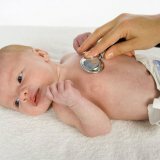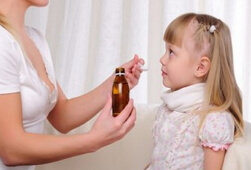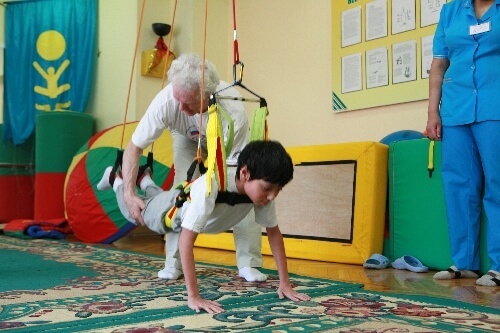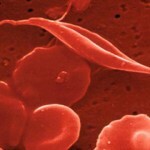Pneumonia of newborns: symptoms, treatment

Pneumonia is a fairly common disease among newborns. The disease is distinguished by the moment of infection, which occurs during the process of gestation and childbirth, and also during the postpartum period. Also pneumonia of newborns differs by types of infections. The nature of the disease and its severity are individual for each newborn. So, predisposition to the so-called."Short breathing," in which newborns have shortened and dilated bronchi, often leads to pneumonia, especially in premature infants.
Etiology of pneumonia consists in the penetration into the body of a newborn almost all bacteria-cocci. Also the cause of the disease pneumonia can be E. coli or fungi.
Infecting pneumonia, a child can either through contaminated air, or bacteria can enter the lungs along with blood that feeds the lungs.
Symptoms of pneumonia
The development of pneumonia and its diagnosis often depend on how the newborn has contracted. If the infection occurred during intrauterine development of the fetus, the pathology can be detected almost immediately after childbirth. The skin of the body of the newborn acquires a gray or yellowish hue, the face turns blue, and the first cry of the newborn is so weak that it is almost not audible - this is how the pneumonia of the newborns appears. Symptoms, treatment is determined by a pediatrician who prescribes medications and a course of treatment for the baby.
Disturbance of breathing is the presence in the auscultation of wet and scattered rales. The temperature of those children who were born on time may rise to 40 ° C, and those who were born before the term can have a decreased body temperature.
In general, the condition of the newborn can be severe. The child can hardly react to external stimuli.
The legs of the newborn swell. The child often belches, and sometimes there is vomiting. This state of the child often leads to rapid weight loss, and there is a slow retardation of the umbilical cord. In healthy children, the umbilical cord falls off rather quickly.
Symptomatic of pneumonia during infection during labor is observed approximately in two days and slightly differs from the symptomatology arising during intrauterine infection.
Elevated temperature is manifested by lethargy and lack of appetite, cyanosis of the skin of the lips and face in the nose, regurgitation and diarrhea.
In term infants, breathing becomes noisy with time, in contrast to the breathing of premature babies, in which it is weak and rare.
Since the newborn's immune system is weakened, pustules on the skin are sometimes observed.
When the infection has penetrated into the baby's body after the birth, it is possible to observe the signs of the airway disease in the form of stuffy nose and runny nose. The child becomes capricious, regurgitates and loses appetite, his sleep is disturbed, the skin of his body pales, and the skin of his face turns blue, the temperature appreciably rises. The child with difficulty breathes, the pulse becomes more frequent.
Treatment of neonatal pneumonia
If symptoms are found, treatment with the appearance of the first signs implies that the newborn should be sent to the hospital, and as soon as possible. Without care and supervision by medical personnel, the treatment of pneumonia can be ineffective. Treatment of pneumonia consists of aerotherapy and oxygen therapy, as well as in the suction of mucus accumulated in the lungs. These manipulations are carried out in a hospital, since it is impossible to conduct this at home.
The baby should be fed as often as possible, because, being in a weakened state, the child will not be able to suck the mother's breast as expected. He quickly gets tired, and yet remains hungry.
Do not swaddle a child, but you need to periodically turn it from side to side, so that his chest occupies an elevated position. This position prevents the stagnation of mucus and blood in the lungs and also helps to normalize breathing.
Antibiotics should be used to suppress infection, and to remove swelling - doctors prescribe the reception of diuretic medicines - which are taken when other methods do not treat pneumonia of newborns. Treatment should be neat and carefully thought out in the choice of medications.
Antibiotics are prescribed only by analysis results, due to the type of pathogen. Also used are sulfonamides, stimulants and vitamins are shown.
As additional treatment measures, UV irradiation, put mustard, alkaline inhalations and healing baths are used.
But you can not do without complications. At the end of the course of treatment for newborns, it takes another year to observe a pediatrician.
The main method of preventing pneumonia is to carry out general measures that will help a pregnant woman not to get pneumonia or other infectious diseases herself.
The child's hypothermia is quite dangerous.
Special attention should be given to breastfeeding the baby, since proper feeding increases the resistance of the child's organism to various infections.
Baby care and proper nutrition
Baby food should be appropriate for the age and needs of the body. If the child has already lost the habit of breastfeeding and eats solid or liquid food, then you should closely monitor how the child eats. Eliminate from the diet of the child salty, sour, and any sharp smells and taste sensations. Broths of wild rose and black currant are very useful.
When the pediatrician has ascertained recovery, the child should stay at home for at least 10 days. He should not go to any children's institutions and let him not communicate with peers - it will give him strength, his body will be able to grow stronger. In these 10 days you can take a course of vitamin therapy, as well as breathing exercises and walks.
If the child has already grown and can drink juices, then be sure to include them in the diet. Also include fruits and vegetables in the menu - they will help gain strength to the body. And do not forget about physiotherapy under the supervision of a pediatrician, who will be able to find suitable exercises for the speedy recovery of your child.



